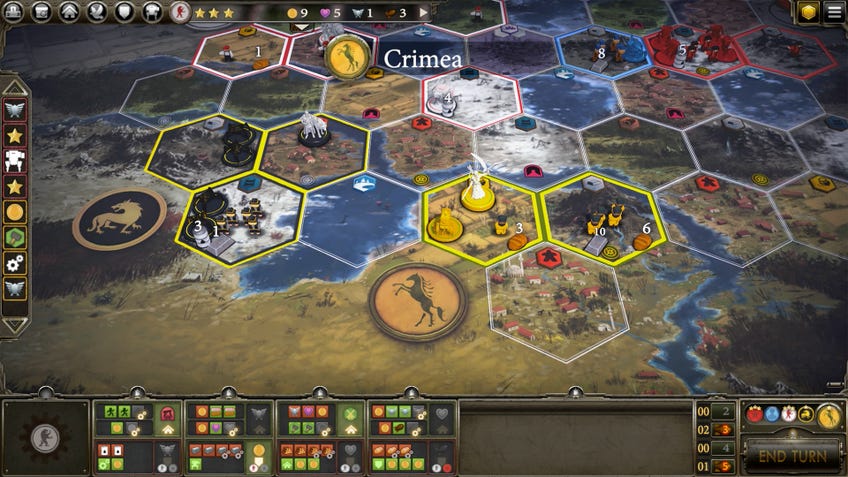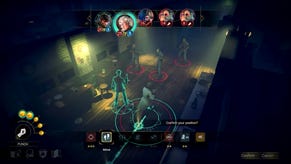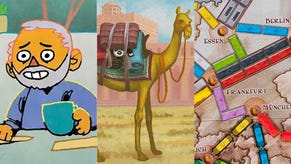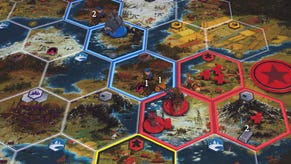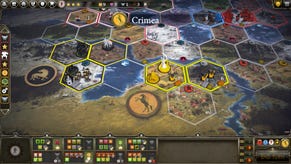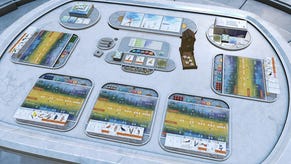Playing Scythe online has given my life stability in a time of great uncertainty
Steel yourselves.
I was planning to play Scythe this year. The dieselpunk board game from Jamey Stegmaier about warring nations clashing on a fictional continent had been on my list of board games to try since Johnny first mentioned it in the office. Of course, I imagined playing the game in its physical incarnation. A copy had been sat in the Dicebreaker game library for months, just waiting for a moment when everyone was together with a couple of hours to spare.
If it wasn’t obvious by now, that copy of Scythe is still sitting untouched in that Kallax cubby - and it will likely remain that way for a while yet.
Being unable to play physical board games with my friends has made these past few months difficult to say the least. Beyond the challenges it presents to my job, an activity that brings me great joy has been taken away and it’s been tough to find an alternative to fill the gap. I know that copy of Scythe isn’t going anywhere and board games aren’t disappearing from our shelves and tables never to be seen again, but with so many events cancelled and releases delayed, not being able to crack open that one box feels like another brick in the proverbial wall that currently surrounds me.
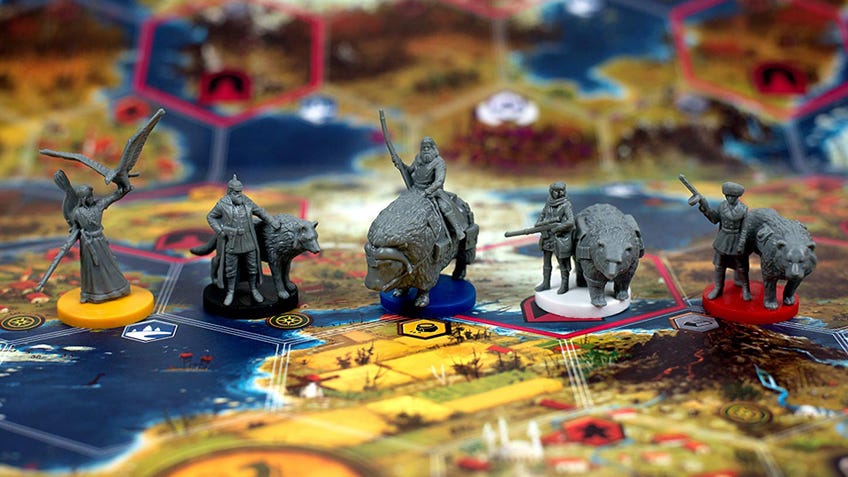
In order to distract myself from said wall I’ve been getting stuck into the digital board game version of Scythe on the PC during the past few weeks. Whilst the ability to play board games online with friends has certainly been a godsend in terms of overcoming the obstacle of distance, playing Scythe’s digital board game edition is still not quite the same experience as it is in person - it’s easier to get distracted or feel disconnected from the on-screen action. Even so, I’m fortunate for the chance to finally give it a go despite all the challenges that have otherwise made playing board games difficult lately.
I know that copy of Scythe isn’t going anywhere, but not being able to crack open that one box feels like another brick in the proverbial wall.
The funny thing is, Scythe isn’t really the kind of board game I’d usually go for. The theming is undeniably excellent and the artwork is stunning. But at first glance it’s intimidating, both in size and scope, and requires a decent understanding of its layered gameplay mechanics in order for any player to have the smallest hope of winning.
At the moment, of course, things are quite different. Having a lot more time on my hands and a desire to learn to play more board games has led me to fling myself into the deepest end of the metaphorical Scythe pool - bears and giant mechs included - by playing at least one game almost every week for the past month or so.
As if that weren’t enough, I’m also playing with people who have considerably more experience with the game and continue to thrash me almost every time we play - except for one glorious victory on my part (so far). Yet, once I’ve gotten over the shame of defeat, I find myself coming back to the game hungry for a better score.
It’s not just that Scythe is enjoyable to play in general. It’s more to do with the specific feeling of personal development that it gives me. Scythe is a board game that’s designed to be played many times. Its rich collection of mechanics and forking paths to victory make it something to be picked away at - to be gradually scaped until you’re happier with what your strategy produced than the last time.
Playing Scythe feels like working on a project or acquiring a skill, such as learning a language or making a quilt. I feel I’m improving at something as worthwhile as both those activities, because playing Scythe involves engaging with some crucial board game mechanics, like struggling for control of the board and managing resources, with an extra level of scrutiny. Although I have plenty of tabletop experience under my belt, Scythe presents a challenge designed to test the minds and skills of players that’s incredibly satisfying once you start getting the hang of it.

Scythe’s five factions - Poliana, Ruskviet, Saxony, Crimea and Nordic - each have their own character and mech abilities that offer a variety of different play styles. They’re combined with different player mats that define the actions you can take each turn, and how much they cost. Getting your head around the advantages of each combination and how to best utilise them is part of the joy of learning Scythe. It might not seem too obvious to begin with, but every one provides a different experience and, more importantly, a new opportunity for player improvement. Each time you return to a faction or player mat, you’ll be more aware of its unique potential and play accordingly.
Playing Scythe feels like working on a project or acquiring a skill. I feel I’m improving at something as worthwhile.
That said, there are some factors you can’t control in Scythe. The randomised missions can be easy to mess up without realising it. And unless you have the ability to read minds, you’ll never be able to predict what your opponents might do to make the game harder for you. But while winning a game of Scythe is a beautiful thing, losing provides its own rewards that help a player to learn where they might have gone wrong and what they could do next time.
Applying what I’ve learned from past experiences and seeing my plans come to fruition is immensely satisfying. I can see the self-improvement in the decisions I’m making and the deliberate intention behind them. My progression fills me with pride - by playing Scythe as often as I have, I’ve become more and more competent with every game, to the point where I feel like I’ve learnt a valuable skill.

Which is honestly something I’ve never felt about a board game before. I’m not a particularly competitive player, and I don’t play Scythe for the sole purpose of winning, but in the space of around a month or so I’ve learnt how to play Scythe better than any other board game I’ve ever played.
Even so, I know there is still so much more to learn. Which is a major reason why I find myself coming back week after week, just as excited to play and improve. Scythe has become my Michelangelo’s David, my Sistine Chapel, my banana bread recipe - especially at the moment, I’m very grateful to have my own grand accomplishment to work away at for a long time to come.
